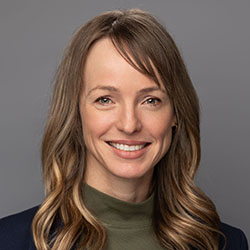Cutting the Cardiac Toll of Childhood Cancer Treatments
Published
Featured Researchers
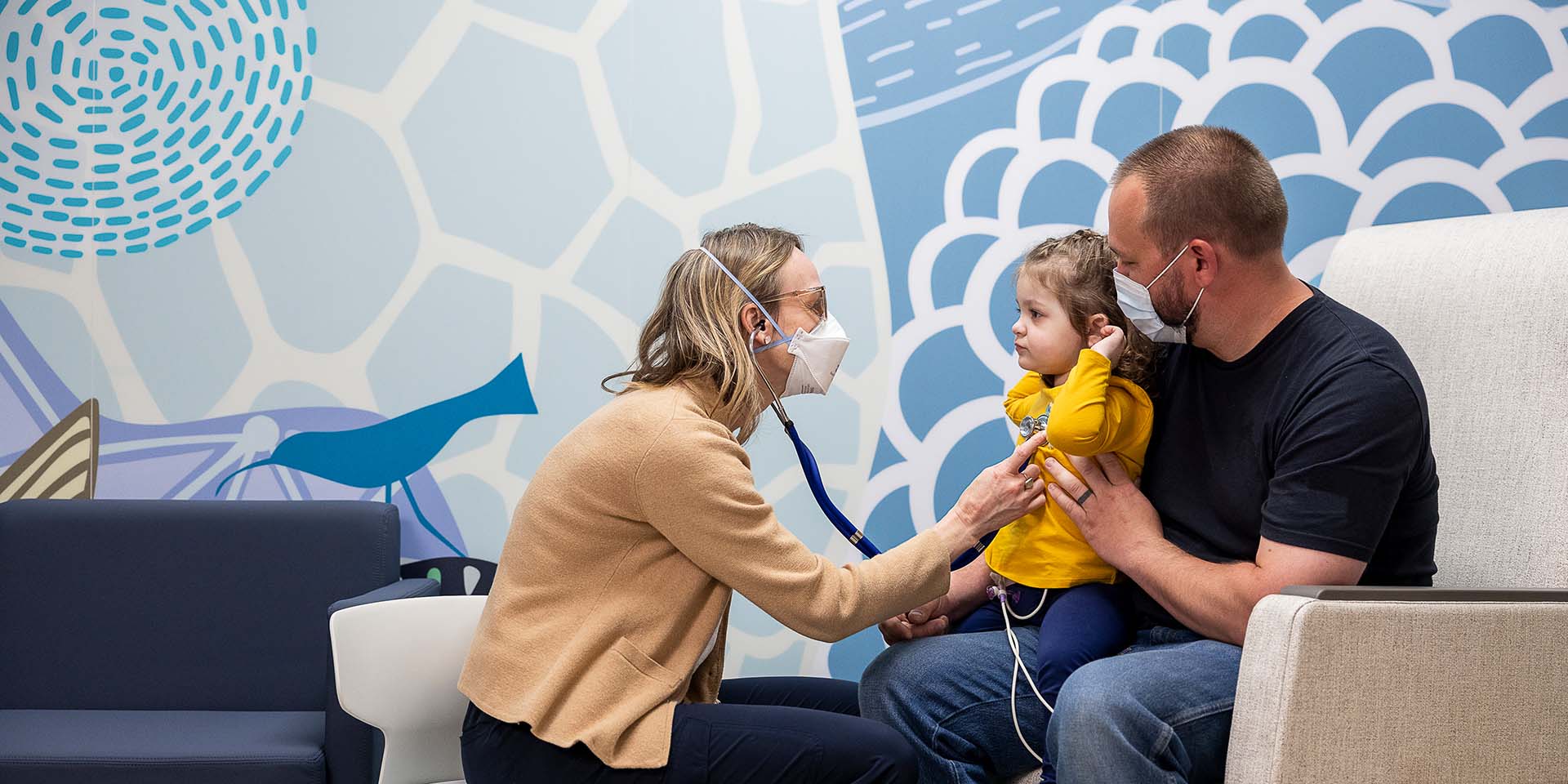
Abstract
Pediatric oncologist Dr. Kasey Leger’s research and clinical leadership drive national and global efforts to improve outcomes for children with cancer, promising not only survival, but lifelong health.
Early in her medical training, Kasey Leger, MD, MSc, was in the midst of a pediatric hematology and oncology fellowship at the University of Texas Southwestern Medical Center. As she learned the ropes of treating kids with cancer and blood disorders, one young patient triggered an inflection point in Dr. Leger’s career focus.
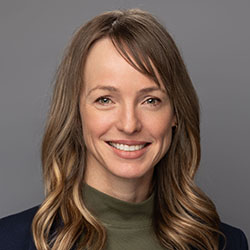 Dr. Kasey Leger
Dr. Kasey LegerHer patient, a 14-year-old with acute myeloid leukemia (AML), was successfully cured of her leukemia with intensive chemotherapy, including high-dose anthracycline therapy. But she died soon after from complications of heart failure and stroke brought on by the cancer therapy.
“It was devastating,” said Dr. Leger, now an attending physician at Seattle Children’s and the Leukemia and Lymphoma Program medical director. “The frustration of helping her beat the cancer but succumbing to the complications of cancer treatment emphasized to me the importance of holding both aims really closely: Cure the cancer, but not at a high cost to the patient and their long-term health.”
Anthracyclines are highly effective and commonly used pediatric cancer therapies, but the risk of cardiotoxicity rises with higher doses. In fact, many types of cancer treatments pose some short- or long-term risk for the development of cardiovascular disease. Pediatric patients may be especially vulnerable to cardiovascular disease because of their young age at treatment and expected long lives.
Leading Pediatric Oncology Research to Lower Chemotherapy Cardiotoxicities
Dr. Leger — who is also a principal investigator in Seattle Children’s Research Institute's Ben Towne Center for Childhood Cancer and Blood Disorders Research — doggedly pursues protecting young hearts while working to cure cancer, with research focused on maintaining the cardiovascular health of childhood cancer patients and survivors.
She studies strategies to lessen the cardiotoxicity of cancer therapy by preventing cardiac damage from happening in the first place by using cardioprotective medications alongside chemotherapy or less toxic forms of anthracyclines. Dr. Leger also seeks to identify patients with early signs of cardiotoxicity in hopes that early intervention will preserve long-term cardiovascular health in cancer survivors.
Dr. Leger leads the Myeloid Cardiotoxicity Working Group of the Children’s Oncology Group (COG), the world’s largest organization devoted exclusively to childhood and adolescent cancer research. It unites over 10,000 experts in childhood cancer globally at more than 200 children’s hospitals — including Seattle Children’s — as well as universities and cancer centers.
We want to continue to drive progress to cures. Seattle Children’s is a beacon of hope for families, and I’m excited for the transformative research ahead that will deliver the most effective therapies with the least toxicity.
She also serves as the cardiac chair of a large COG clinical study for patients with AML, comparing standard therapy to an investigational treatment, CPX-351, a more easily absorbed form of anthracycline. Though CPX-351 did not improve cancer outcomes over standard therapy, the study’s cardiac researchers are using the data to better understand how to best protect the heart during chemotherapy. Dr. Leger and University of Pennsylvania and Cleveland Clinic’s Lerner Research Institute collaborators are currently analyzing more than 3,000 echocardiograms and 4,000 plasma specimens for circulating biomarkers of cardiac injury and stress from around 750 patients treated on the study. This detailed cardiac data will not only inform the most effective strategy for reducing anthracycline-induced cardiac injury, it will also help identify patients at highest risk for cardiac dysfunction despite prevention efforts to allow additional interventions early in the course of their disease.
“We’ve learned that patients who have cardiac dysfunction during or soon after leukemia therapy are less likely to be cured of and survive their leukemia,” Dr. Leger said. “While we’re still working to fully understand how and why cardiac dysfunction compromises cancer survival, this stark reality emphasizes the importance of protecting the heart during cancer therapy to allow for cancer cure and health in survivorship.”
She believes ongoing research will lead to a future where doctors better understand the intersection of leukemia-specific and cardiac risks to guide treatment decisions.
“Our goal is to advance precision medicine in pediatric cancer care so each patient’s cancer and heart function inform optimal individualized cancer and supportive therapy,” she said.
A Critical Collaboration: Integrated Pediatric Cardio-Oncology Care
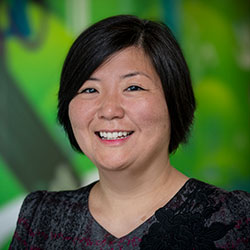 Dr. Borah Hong
Dr. Borah HongGiven the critical importance of protecting the heart while delivering lifesaving cancer therapy, Dr. Leger and her team rely on close collaboration with the cardiologists in Seattle Children’s Heart Failure Program, led by Borah Hong, MD. Seattle Children’s has been designated a Center of Excellence by the International Cardio-Oncology Society. Dr. Hong and her team provide comprehensive cardiovascular care integrated directly into oncology and bone marrow transplant services, addressing both acute and chronic cardiac complications arising from conventional and novel cancer therapies.
As new targeted medicines and immunotherapies become available — many with emerging profiles of cardiotoxicity — this interdisciplinary teamwork between pediatric oncologists and cardiologists is increasingly vital to optimizing effective cancer therapy and promoting long-term health in survivorship.
Improving Childhood Cancer Outcomes Through Research, Heart and Partnership
While Dr. Leger’s passion for cardiovascular health in childhood cancer patients and survivors drive her research endeavors and remains a key focus of her clinical care, her desire to cure all children of cancer is what keeps her up at night.
She values the depth and breadth of expertise and partnership in the Seattle Children’s Leukemia and Lymphoma Program that offers patients the most effective and cutting-edge therapies to give them the absolute best chance of survival.
Dr. Leger admits the demands of patient care, research and leadership are taxing, but says the pursuit is incredibly worthwhile.
“I really love the patients that I get to take care of,” she said. “I find it very fulfilling to partner with families as they're battling cancer with their child; to meet a family in their place of overwhelm and fear of the unknown and journey alongside them to bring hope and healing. Having a plan and explaining that plan in a way families can digest — and helping them see a future for their child — is extremely meaningful.
“Of course, we are all profoundly impacted by cases where our patients are not doing well and all the resources I have at my disposal are not enough. That's what really drives me to continue doing research to try to improve outcomes for all patients,” Dr. Leger said.
Fulfilling Her Calling as a Physician
Though “doctor” was always her answer to the childhood question of “What do you want to be when you grow up?”, Dr. Leger tried to resist.
“I had an aunt who was a mom and an ophthalmologist, and her advice to me was, ‘If you can find something else that would fulfill your calling, go do that’ because practicing medicine is a long road, a lot of work and it’s a hard juggle with a family,” she said.
So, Dr. Leger studied chemical engineering with a biomedical focus as an undergrad, hoping that could be her route to medical innovation and impact.
“But it was not close enough to the bedside for me,” she said. “The patient part, the healing piece, were really important, and I found my path continuing to veer me back toward becoming a physician.”
Nonetheless, Dr. Leger says the engineering background aids her research: “It’s been very helpful in being able to understand the problems in medicine and set out to find solutions in a structured and analytical way,” she said.
Leading Transformative Leukemia Care and Research at Seattle Children’s
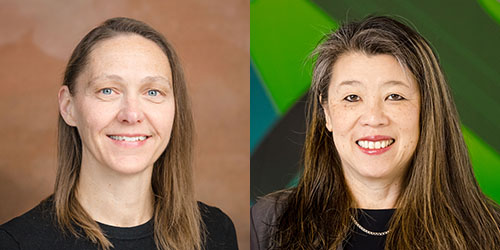 Dr. Rachel Rau (left) and Dr. Mignon Loh
Dr. Rachel Rau (left) and Dr. Mignon LohDr. Leger is proud of Children’s Leukemia and Lymphoma Program successes: “It’s been a really exciting year for our team. We've had some big advances in leukemia research with Dr. Rachel Rau’s and Dr. Mignon Loh’s blinatumomab findings. That really has revolutionized therapy for acute lymphoblastic leukemia (ALL),” she said. “I think it’s very inspiring for our faculty and for our patients and families to see our research efforts changing the care we're providing in real time.
“While children with ALL have excellent outcomes, there are a lot of other diagnoses where our current therapies fall short. We want to continue to drive progress to cures,” Dr. Leger said. “Seattle Children’s is a beacon of hope for families, and I’m excited for the transformative research ahead that will deliver the most effective therapies with the least toxicity.”
— Colleen Steelquist

